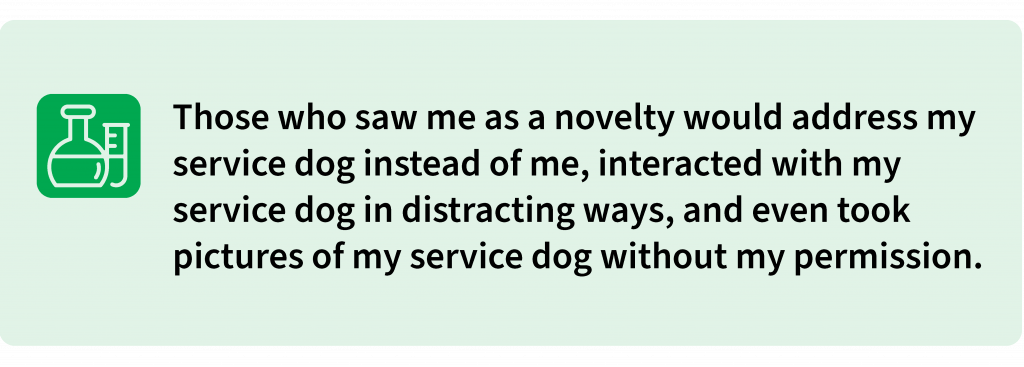10 Navigating a Teaching Lab with Epilepsy
![]() “Creating accessibility guidance and listening to the experiences of disabled students can go a long way for creating better lab course experiences.”
“Creating accessibility guidance and listening to the experiences of disabled students can go a long way for creating better lab course experiences.”
By Dominique Daniels
Throughout my undergrad, lab courses were by far my favourite as I was always excited for the chance to learn and practice new lab skills. But lab courses also came with many challenges related to my disability. All my classmates and most professors, lab coordinators and TAs were supportive and willing to make the necessary accommodations. However, the first few years of my degree were made very difficult by the fact that the Faculty of Science was unprepared and ill-equipped for a student with a service dog. This unpreparedness resulted in little to no guidance for protecting my service dog in the lab, leaving me to come up with safety procedures and make PPE choices on my own. This was a very challenging task for a first-year student who had never been in a lab before.

The unpreparedness also affected the way I was treated by several members of the faculty. It seemed like many people in the faculty saw a student with a service dog as either an inconvenience or a novelty. Those who saw me as an inconvenience made it clear that they didn’t agree with allowing a service dog to be in a lab, and I was even told by someone in a leadership role in the faculty that when I was on CO-OP terms it “made [their] life easier” because I wasn’t in any lab courses. These comments were discouraging, and I began to think there wasn’t a place for me in science and doubted my abilities to pursue a career in research. Those who saw me as a novelty would address my service dog instead of me, interacted with my service dog in distracting ways, and even took pictures of my service dog without my permission. Once a TA took and posted a photo of my service dog in PPE to Reddit without my permission or knowledge. This post became very popular and resulted in me receiving death threats and messages telling me to “get out of science”. Now I see this incident as a misguided attempt to post a cute picture of a dog in PPE, but at the time I was terrified and saddened by the way people viewed disabled students.
With more awareness and training for staff, many of these experiences could be avoided for disabled students in the future. Creating accessibility guidance and listening to the experiences of disabled students can go a long way for creating better lab course experiences. I’m thrilled to see the new accessibility efforts being made by the Faculty of Science and my hope is that the next cohort of disabled students won’t feel the way I did during my undergrad.

